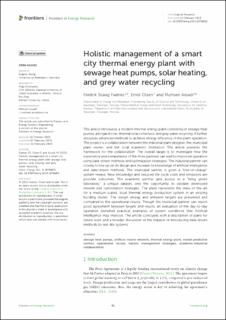| dc.contributor.author | Fadnes, Fredrik Skaug | |
| dc.contributor.author | Olsen, Ernst | |
| dc.contributor.author | Assadi, Mohsen | |
| dc.date.accessioned | 2023-05-02T12:24:17Z | |
| dc.date.available | 2023-05-02T12:24:17Z | |
| dc.date.created | 2023-02-27T10:33:27Z | |
| dc.date.issued | 2023 | |
| dc.identifier.citation | Fadnes, F. S., Olsen, E., & Assadi, M. (2023). Holistic Management of a Smart City Thermal Energy Plant with Sewage Heat Pumps, Solar Heating and Grey Water Recycling. Frontiers in Energy Research, 11, 127. | en_US |
| dc.identifier.issn | 2296-598X | |
| dc.identifier.uri | https://hdl.handle.net/11250/3065782 | |
| dc.description.abstract | This article introduces a modern thermal energy plant consisting of sewage heat pumps, a biogas boiler, thermal solar collectors, and grey water recycling. It further discusses advanced methods to achieve energy efficiency in the plant operation. The project is a collaboration between the industrial plant designer, the municipal plant owner, and the local academic institution. The article presents the framework for the collaboration. The overall target is to investigate how the experience and competence of the three partners can lead to improved operation using data-driven methods and optimization strategies. The industrial partner can closely follow up on its design and increase its knowledge of artificial intelligence and data-driven methods. The municipal partner is given a “free-of-charge” system review. New knowledge and reduced life cycle costs and emissions are possible outcomes. The academic partner gets access to a “living green laboratory,” a unique dataset, and the opportunity to validate developed models and optimization strategies. The plant represents the state-of-the-art for a medium scaled, local thermal energy production system in an existing building cluster. The design energy and emission targets are presented and compared to the operational results. Though the municipal partner can report good agreement between targets and results, an evaluation of the day-to-day operation identified practical examples of system conditions that Artificial Intelligence may improve. The article concludes with a description of plans for future work and a broader discussion of the impacts of introducing data-driven methods to real-life systems. | en_US |
| dc.language.iso | eng | en_US |
| dc.publisher | Frontiers Media S.A. | en_US |
| dc.relation.uri | https://www.frontiersin.org/articles/10.3389/fenrg.2023.1078603/full | |
| dc.rights | Navngivelse 4.0 Internasjonal | * |
| dc.rights.uri | http://creativecommons.org/licenses/by/4.0/deed.no | * |
| dc.title | Holistic management of a smart city thermal energy plant with sewage heat pumps, solar heating, and grey water recycling | en_US |
| dc.type | Peer reviewed | en_US |
| dc.type | Journal article | en_US |
| dc.description.version | publishedVersion | en_US |
| dc.rights.holder | The authors | en_US |
| dc.subject.nsi | VDP::Teknologi: 500 | en_US |
| dc.source.volume | 11 | en_US |
| dc.source.journal | Frontiers in Energy Research | en_US |
| dc.identifier.doi | 10.3389/fenrg.2023.1078603 | |
| dc.identifier.cristin | 2129522 | |
| dc.relation.project | Norges forskningsråd: 311269 | en_US |
| cristin.ispublished | true | |
| cristin.fulltext | original | |
| cristin.qualitycode | 1 | |

